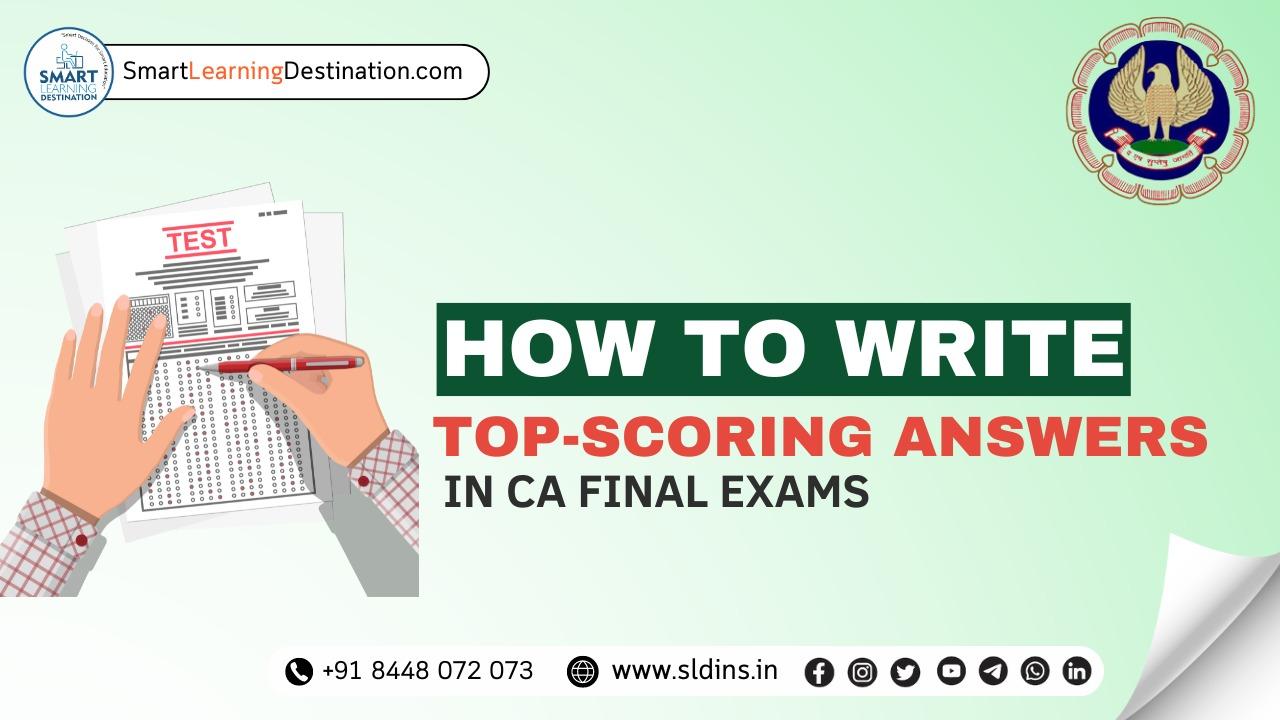If you're preparing for your CA Final exams, you likely already know that the art of writing answers is as important as knowledge of the concepts. Doing well has nothing to do with just knowing the stuff; it's actually about how you present that knowledge on the paper during your exam. This blog walks one through practical tips and insights on how to write top-scoring answers, even if you do not consider yourself a brilliant writer.
First, know what an examiner wants. Examiners look for clarity, accuracy, and a structured approach. They really are looking at how well you can communicate your knowledge under pressure.
Personal Anecdote: While I was preparing for my CA Finals, I realized no matter how well I knew the subject, it was quite tough to put that on paper. A few duds helped me realize that examiners liked only those answers, which were easy to read and well-structured.
Tip 1: Begin with a Good Introduction.
The introduction draws the reader into the rest of your response. It is your first impression, so it must be a good one. Start by making a statement of what the question is asking and what you will use to answer it. It serves to indicate to the examiner that you have understood the question and, most importantly, you have elaborated on the approach you will take in answering the question.
Example: If one of the questions wants a report on whether a given accounting standard applies or not, then start off by defining the standard and its relation to, relevance for, the scenario described in the question at hand.
Tip 2: Use Bullet Points and Subheadings
If the question is of a lengthy nature, it is very easy to lose track of the points that you then have to cover. Bullet points and subheadings will help keep your answer organized; more important, it will make your thought process easier for the examiner to follow.
Example: Don't pen down a big paragraph; rather, while answering a question, break it down in parts like "Key Points," "Application," and "Conclusion." This way you will make your answer more reader-friendly, and also, you won't skip any important point.
Tip 3: Manage Your Time
One of the biggest challenges in CA Final exams is time management. You have to strike a balance between quality and speed. Answer writing practice under controlled time settings will give you an idea of how much time you can afford to spend on each question.
Personal Experience: On my first try, I let myself take a lot of time on the initial questions, and then there wasn't enough time left for the latter part of the exam. Next time, I'll make sure to write timed; doing this will enable me to divide my time much wiser on the real exam.
Tip 4: Clarity and Precision
Your answers have to only be clear and concise. Avoid making jargon or difficult sentences that would just spoil your idea. Remember, the effort is to express your understanding in as much clarity as possible.
Example: Instead of saying, "In the financial reporting framework as stipulated in the above standard…", you could just say, "The standard requires…" It makes the answer easily readable and conveys your ability to explain concepts without beating around the bush.
Tip 5: Engage with Examples
Where-ever possible substantiate the answers with relevant examples. This will not only demonstrate to the examiner that you have understood the subject matter but also that you have the presence of mind to apply theoretical knowledge in practical situations.
Example: If a question asks, for example, how deferred tax assets are to be treated, then you should give a brief example as to how such would be treated in real life. This helps the examiner see that you are not just repeating bookwork knowledge but actually know how it works in practice.
Tip 6: Review and Revise
If you have time, check over your answers again before you hand in your test. Look for anything you overlooked and scan for clarity and accuracy. Even a very quick check may remind you to pick up on tiny mistakes that could cost marks.
Personal Tip: While writing my exams, I always reserved the last 10 minutes for a quick review of my answer sheet. This helped me correct a few of the mistakes and add some points that I missed while writing the answer.
Tip 7: Stay Calm and Confident
At last, never be flustered or nay-saying in your mind during the test. Stress could make one commit mistakes; hence, it is very important to keep a positive attitude. Just remind yourself that it is something you have prepared for and now would be the time to put up your best.
Example from Personal Experience: Used to carry a very simple reminder—a piece of note that says, "Stay Calm." It really helped to keep me cool during those stressful moments so that my mind remained focused on the correct writing of answers.
Conclusion: Practice Makes Perfect
The practice and its continuous improvement hold the key to writing top-scoring answers in CA Final exams. So don't get disheartened if you don't get it right in the very first attempt. The more you practice, the more efficient you become in the structuring of answers, time management, and the conveying of knowledge.
Final Thought: Look at the answer sheet as an opportunity to talk to the examiner. Be clear, concise, and to the point. Develop a proper approach, and try to see how you can convert your precious knowledge into high-scoring answers so that you can realize your dream of clearing the CA Finals.
Good luck, and remember—an excellent answer is born out of a clear understanding and a strong mentality.
Read More Blogs:-
